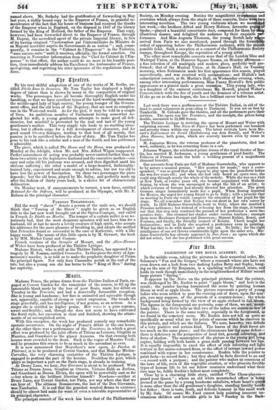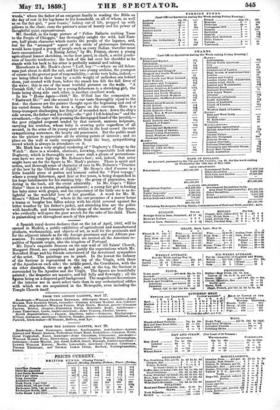Put iris.
EXHIBITION OF THE ROYAL ACADEMY. IL
In the middle room, taking the pictures in their numerical order, Mr. Solomon's " Fox and the Grapes," where a coxcomb whose airs have not even drawn out a look from two dashing Ladies Betty and Sophy, hang- ing on the arm Of Sir Benjamin, is a sparkling' well-Areifsed scene, and holds its rank though immediately in the neighbourhood of Millais' second large picture " Spring."
It appears by the Notes on the principal pictures, that the painter, was challenged by Mr. Ruskin to paint " apple bloom," and here is the result; the painter having humanized the scene by painting human bloom as well as apple bloom. The picture represents a party of young ladies who seem settled to pass the evening out of doors, upon the mar- gin, you may suppose, of the grounds of a country-house ; the whole background being formed by the view of an apple orchard in full bloom. The figures in the foreground are portraits, some of them, we see, merci- lessly like ; the Critic tells us that two of the ladies are sisters-in-law of the painter. There is the same reality, especially in the foreground, as we found in the cemetery scene. Mr. Ruskin does not tell us quite so specifically as usual what are the points of success which he observes in this picture, and which are the failures. We note, howetur, two defects of a very positive and serious kind. The leaves of the fruit forest are too much on the same plane ; and the-chiaroscuro has the same defect— there is deficiency in the perspective of local tint, general colouring, and force of shadow. The masterpiece of the picture is the young girl lying supine, holding with both hands a grass stalk passing betWeen her lips. It is equally impossible to excel the effect of rich colouring and light texture in her maize-coloured dress, or the effect of intense inward power combined with repose in her countenance. Ruskin tells the painter to paint factsto record facts ; but they should be facts directed to an end —a record with a purpose ; and the painteiwho makes us conscious of the laws of life, even of the vegetable creation, or who" presents forcible types of human life to let our fellow creatures understand what their race may be, fulfils Ruskin's behest most completely. - Close by is a charming little story, entitled " The Chess-players- guard your Queen " ; where an old white moustached -officer is being pressed at the game by a young handsome subaltern, whoie heart's quiet' is none other than the old gentleman's daughter, standing timidly beside her father : there is taste, truth, and delicate humiur in this small work by Mr. Gale. Of course Mr. Feed cannot help painting innocent un- conscious children and loveable girls in his " Sunday in the Busk-
woods," where the father of an emigrant family is reading the Bible on the day of rest in his log-home to his household, on all of whom, as well as on the fair girl, " poor Jeanie," fading out of life, propped up with pillows in the chair, rests the painter's sense of beauty and his power of thoughtful quiet expressiveness.
Mr. Goodall, in his large picture of " Felice Ballarin reciting Tasso to the People of Chioggia," has thoroughly caught the wild, half East- ern, half pirate character which marks the people of the lagunes, and, but for the "arranged" aspect of the circle of picturesque listeners, would have typed a group of people such as every Italian traveller must have encountered. " A Rising Artist," by Mr. Friston, shows a young agricultural limner sketching, on the door panel, in chalk, a stolid gentle- man of bucolic tendencies : the look of the lad over his shoulder as he stands with his back to his sitter is perfectly natural and taking. Hereabouts is Mr. Hook's clever " Luff, boy !"-where an old fisher- man just about to shift the sail, and his two young urchins, the youngest of course in the gravest post of responsibility,-at the very helm, indeed,- are being lifted in their boat by a noble weight of unbroken sea behind them, just crested with foam, before the smack has felt the full force of the wave ; this is one of the most truthful pictures on the walls. " A Cornish Gift," of a lobster by a young fisherman to a shrinking girl, the boats being along side each other, is another_ excellent work.
In his " Home Again-1858," Mr. O'Neil has the companion to " Eastward Ho!" and the second is to our taste thoroughly equal to the first : the chances are the painter thought upon the beginning and end of his varied drama before he drew a figure on the canvass. _ Here is a troop-transport discharging her freight of wounded men : down the ship's side swarm, the father and his child,-the " girl I left behind me " and the sweatheart,-the eager wife pressing the disengaged,hand of the invalid,- the poor crippled sergeant tended by that earnest, anxious helpmate, carrying his crutches, whose baby is crowing quite regardless of all around, in the arms of its young aunt whilst in the boat crowd the rude sympathizing watermen, the hearty old pensioners. But the public must see the picture to appreciate all its stirring points of interest ; and its place on the wall is easily recognisable froni the busy, sympathizing crowd which is always in attendan& on it. '
Mr. Mark has a very original rendering of " Dogberry's Charge to the Watch ": there is a wooden, obstinate, knoWing, respectable look about Dogberry, which is thoroughly new; some such a gleam of pretentious- ness have we seen light up Mr. B.obson's faci;, and, indeed, that actor might have sat for the figure in Mr. Mark's picture. • There is spirit and action, and thorough sense of character of race in Mr. Dobson's "Practice of the bow by the Children of judali.", &One's chef d'oeuvre is a little humble piece of pathos and humour called the " First voyage," where a young fisherman, aged .fok or five years, is being despatched in his huge habiliments for his starling trip : the group of playmates, won- dering in the back, aid the *et admirably. In Mr. Cope's "Elder Sister" there is a tender, pleasing sentiment; a young fair girl is feeding her baby sister with grapes, and the expectancy of the little one is as de- lightful as the watchful love of lier guardian. A word for Mr. M. Stone's " Silent Pleading," where in the out-premises of a manor house a tramp or burglar has fallen asleep with his child covered against the bitter weather by his father's jacket, and attending him are the police with handcuffs, and humanity in the shape of the master of the house, who evidently will spare the poor wretch for the sake of his child. There is painstaking art throughout much of this picture. - -



























 Previous page
Previous page